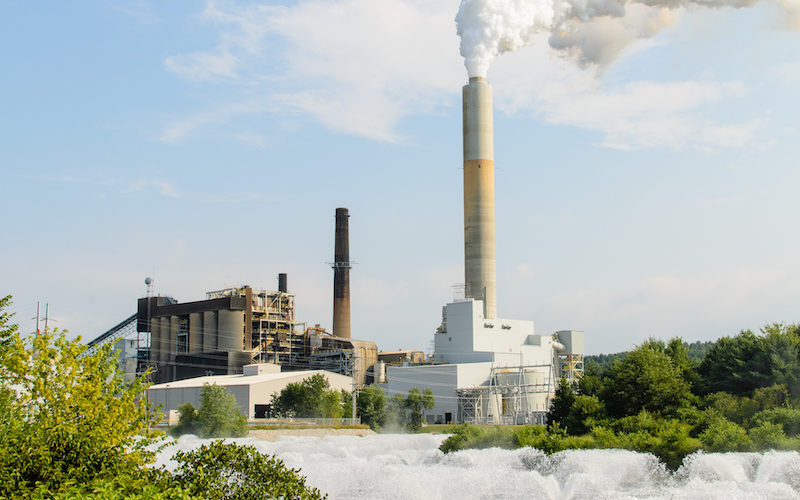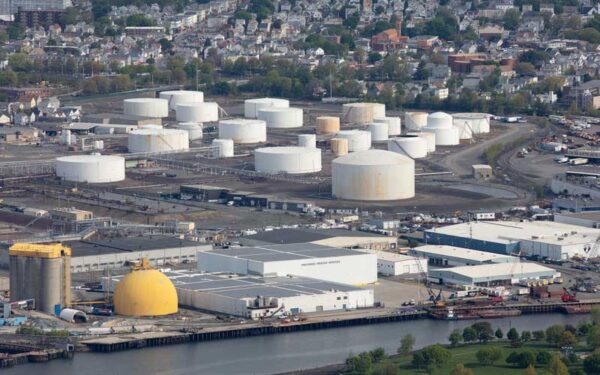
The Merrimack Station coal plant pollutes the air and water in Bow and other local communities. Photo Credit: Flikr
When we think of dirty energy, coal-fired power plants often come to mind. And with good reason. Coal plants pump harmful pollution into our air, including harmful greenhouse gases that fuel climate change. That’s why CLF set out years ago to achieve a coal-free New England.
The good news is that coal-fired power plants across the region have been shutting down, and with the shuttering of those plants we’ve moved New England’s energy in a much cleaner direction. Perhaps nothing captures this fact better than the ongoing demolition of New England’s largest coal-fired power plant – Brayton Point in Somerset, Massachusetts – to make way for a new clean energy commerce center designed to support the burgeoning offshore wind industry.
But our work isn’t over yet, and we need to expand our ideas of dirty power beyond just air emissions. Coal plants can also pollute our waterways, and one of the last remaining coal plants in New England – Merrimack Station in Bow, New Hampshire – is doing just that. That’s why CLF and Sierra Club have joined together to sue the plant in federal court, to end its ongoing harm to the Merrimack River.
The Last Coal-fired Power in New England
Unfortunately, New Hampshire is home to two of New England’s three remaining coal-fired power plants – Merrimack Station in Bow and Schiller Station in Newington. At a time when other coal-fired power plants were being shuttered because they couldn’t compete in the market, these two plants managed to hang on. Why? Because they were owned by Eversource – the last electric utility in New England to own power generation facilities – meaning that the plants were effectively subsidized by the New Hampshire families and businesses who purchased their energy from Eversource.
To address this challenge, CLF and others worked to move Eversource out of the power generation business and expose the plants to true competition in the market. Finally, in 2018, Eversource sold its coal-fired power plants to Granite Shore Power, LLC, removing the burden of these outdated, inefficient, polluting plants from the backs of Eversource energy customers.
A Coal Plant Trashing the Merrimack River
But while Granite Shore operates its recently purchased coal plants in the competitive market, without the support of ratepayer subsidies, its operations do not capture the true environmental cost of its power. For example, Merrimack Station’s cooling system is dangerously outdated. It removes water from the Merrimack River, often capturing and killing aquatic life in the process, uses the water to cool its operating systems, then discharges the heated water back into the river. These so-called thermal discharges are frequently over 90-degrees Fahrenheit (well above the river’s natural temperature) with impacts reaching up to three miles downstream.
Unfortunately, these ongoing discharges are having an enormous adverse impact on the health of the Merrimack River. In fact, the plant’s heated discharges have dramatically altered the natural ecology of a significant stretch of the Merrimack River, harming native fish species while creating conditions that have benefitted an invasive species of clam (clams that are known to clog pipes and waterways, as well as steal vital resources from native fish). This has resulted in a nearly 95 percent drop in resident fish species, including two important game fish – Yellow Perch and American Shad.
The Merrimack River has long been prized by local communities for its wildlife and beauty, as well as for fishing, boating, and other recreational opportunities. The harmful – and illegal – operations of this coal plant jeopardize all of this.
Fighting for a Healthy Merrimack River
For several years, the Environmental Protection Agency (EPA) has acknowledged the power plant’s damaging impacts on the Merrimack River, saying it would issue a new Clean Water Act permit that requires the plant to build modern cooling towers to dramatically reduce heat pollution into the river. CLF strongly supports such a requirement. However, despite the fact that Merrimack Station continues to operate under a Clean Water Act permit that expired in 1997, the EPA has yet to issue a new permit, allowing harmful thermal pollution to continue.
We’re not content to wait any longer. CLF and Sierra Club recently sued Granite Shore and Eversource in federal court to hold them accountable for violating the Clean Water Act and harming our iconic Merrimack River.
The full impact of dirty energy can sometimes be overlooked. Merrimack Station can no longer turn its back on the river from which it derives its name.



